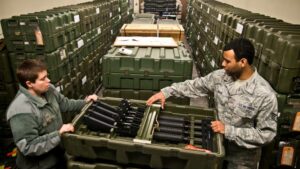
WASHINGTON — The Pentagon’s procurement process is one of several major obstacles hampering efforts to develop and apply artificial intelligence technology, a panel of AI experts told members of Congress Tuesday.
The ninety-minute hearing, convened by the House Armed Services Committee to assess the barriers inhibiting the Department of Defense’s adoption of AI, was framed by bipartisan geopolitical anxieties: how can the U.S. maintain its technological edge over China, and what are the risks of falling behind? Experts said the Pentagon has shown an inability to efficiently identify, acquire, and deploy promising new technology, hurting its bid for AI supremacy.
“One of the challenges in adopting AI in the government, in particular the Department of Defense, is the slow procurement process,” Haniyeh Mahmoudian, an ethicist at the AI platform DataRobot, told lawmakers. “AI is an evolving space and long procurement cycles and delays can lead to obsolete AI tools that will require retraining due to changes in data over time.”
A Government Accountability Office report published last month found that the DoD lacks a “comprehensive department-wide guidance for AI acquisitions.” This oversight, the report said, “could result in acquisition of AI capabilities across the services that does not consistently address the unique challenges associated with AI or the specific needs of the acquiring service.”
The Pentagon piloted an online contract exchange called Tradewind last year to expedite the acquisition of AI technology. Alexandr Wang, the founder and CEO of data processing company Scale AI, thinks the platform is worth building upon.
“What we need to look towards in the next era of AI is doubling down on some of these fast procurement methods and ensuring that we continue to innovate,” he said at the hearing.
Wang’s firm secured $250 million in DOD funding last January. The contract bankrolls several data-heavy projects across different branches, including Army robotic combat vehicles and vast, department-wide pattern recognition systems.
The Pentagon’s partnership with Scale epitomized recent efforts by American military leadership to translate its abstract commitments to AI integration into concrete policies and programs. The department launched the Chief Digital and AI Office in 2022 to coordinate the agency’s ever-evolving medley of AI-related proclamations, tests and hardware. The GAO estimates that the newborn office oversees close to 700 AI projects.
A top-down redesign of the agency’s acquisition policies won’t be enough to guarantee American victory in the AI arms race, the witnesses cautioned.
Wang spent much of his testimony knocking the Pentagon’s wasteful approach to data usage.
“AI systems are only as good as the data that they are trained on,” Wang told lawmakers. “The DoD creates more than 22 terabytes of data daily, and because of their outdated data retention and management policies, warfighters, analysts, and operators are unable to tap into its full potential because it is not AI-ready.”
Wang and his peers suspect DoD’s poor data processing capabilities could be the product of insufficient AI-specific military spending.
“China is spending between 1% and 1.5% of its military budget on AI, while the US is spending between 0.1% and 0.2%,” according to Wang. “Adjusted for the total military budget, China is spending ten times more than the U.S.”
The expert panel and their congressional questioners also dissected the DOD’s ethical guidelines surrounding the technology. The agency released a broad set of “ethical principles for the use of AI” in February 2020. The next step, DataRobot’s Mahmoudian said, requires making these “abstract” frameworks “practical” by educating personnel and leadership about the technology’s implications.
Rep. Mike Gallagher (R-WI), chairman of the Cyber, Information Technologies, and Innovation subcommittee, painted the consequences of stagnation in stark relief.
“Do we want AI to be leveraged for good and the deterrence of conflict, or evil and the proliferation of it? If the former, the United States must not ‘pause,’” he said in his opening statement. “We must continue developing this revolutionary technology to preserve U.S. technological and moral leadership, and ensure artificial intelligence, and its associated norms and guardrails, are defined by freedom and our ideals, not the CCP’s.”
Jaime Moore-Carrillo is an editorial fellow for Military Times and Defense News. A Boston native, Jaime graduated with degrees in international affairs, history, and Arabic from Georgetown University, where he served as a senior editor for the school’s student-run paper, The Hoya.
- SEO Powered Content & PR Distribution. Get Amplified Today.
- PlatoData.Network Vertical Generative Ai. Empower Yourself. Access Here.
- PlatoAiStream. Web3 Intelligence. Knowledge Amplified. Access Here.
- PlatoESG. Automotive / EVs, Carbon, CleanTech, Energy, Environment, Solar, Waste Management. Access Here.
- BlockOffsets. Modernizing Environmental Offset Ownership. Access Here.
- Source: https://www.defensenews.com/artificial-intelligence/2023/07/18/sluggish-procurement-stalling-pentagon-progress-on-ai-experts-say/
- :has
- :is
- :not
- :where
- 1
- 13
- 2%
- 2020
- 2022
- 22
- 70
- a
- About
- ABSTRACT
- According
- accountability
- acquire
- acquiring
- acquisition
- acquisitions
- across
- address
- Adopting
- Adoption
- Affairs
- agency
- AI
- AI Integration
- AI platform
- also
- American
- an
- Analysts
- and
- Apply
- approach
- arabic
- ARE
- armed
- arms
- Army
- artificial
- artificial intelligence
- AS
- assess
- associated
- At
- barriers
- BE
- because
- behind
- between
- bid
- bipartisan
- boston
- branches
- broad
- budget
- Building
- by
- called
- CAN
- capabilities
- ceo
- chairman
- challenges
- Changes
- chief
- China
- Close
- combat
- commitments
- committee
- company
- conflict
- Congress
- Congressional
- Consequences
- continue
- contract
- coordinate
- could
- creates
- cyber
- cycles
- daily
- data
- data processing
- DataRobot
- Defense
- defined
- delays
- Department
- department of defense
- deploy
- develop
- developing
- different
- digital
- DoD
- does
- doubling
- down
- due
- Edge
- editor
- Editorial
- educating
- efficiently
- efforts
- enough
- ensure
- ensuring
- Era
- ethical
- evolving
- exchange
- expedite
- expert
- experts
- Falling
- FAST
- February
- February 2020
- fellow
- Firm
- For
- Former
- found
- founder
- Founder and CEO
- frameworks
- Freedom
- from
- full
- funding
- GAO
- geopolitical
- good
- Government
- Government Accountability Office
- guarantee
- guidance
- guidelines
- Hardware
- he
- hearing
- his
- history
- House
- How
- HTTPS
- identify
- if
- images
- implications
- in
- inability
- Including
- information
- innovate
- Innovation
- integration
- Intelligence
- International
- into
- IT
- ITS
- January
- jpg
- Knocking
- Last
- Last Year
- launched
- lawmakers
- lead
- Leadership
- Long
- Look
- maintain
- major
- Making
- management
- Members
- methods
- mike
- Military
- million
- Month
- moral
- more
- much
- must
- native
- Need
- needs
- New
- news
- next
- norms
- obsolete
- obstacles
- of
- Office
- on
- ONE
- online
- only
- opening
- operators
- or
- our
- over
- Oversight
- panel
- Paper
- particular
- Partnership
- Pattern
- pentagon
- Personnel
- piloted
- platform
- plato
- Plato Data Intelligence
- PlatoData
- policies
- poor
- potential
- principles
- process
- processing
- procurement
- Product
- Programs
- Progress
- projects
- promising
- Race
- recent
- recognition
- redesign
- relief
- report
- require
- requires
- result
- retention
- retraining
- revolutionary
- risks
- s
- Said
- say
- Scale
- scale ai
- School
- senior
- service
- Services
- set
- several
- shown
- slow
- sluggish
- some
- Space
- specific
- Spending
- spent
- STAGNATION
- stark
- Statement
- States
- Step
- subcommittee
- Surrounding
- Systems
- Tap
- technological
- Technologies
- Technology
- ten
- testimony
- tests
- than
- that
- The
- their
- These
- they
- Thinks
- this
- time
- times
- to
- tools
- Total
- towards
- trained
- translate
- Tuesday
- u.s.
- unable
- unique
- United
- United States
- university
- upon
- us
- Usage
- use
- Vast
- Vehicles
- victory
- want
- was
- we
- What
- while
- will
- with
- worth
- year
- zephyrnet












